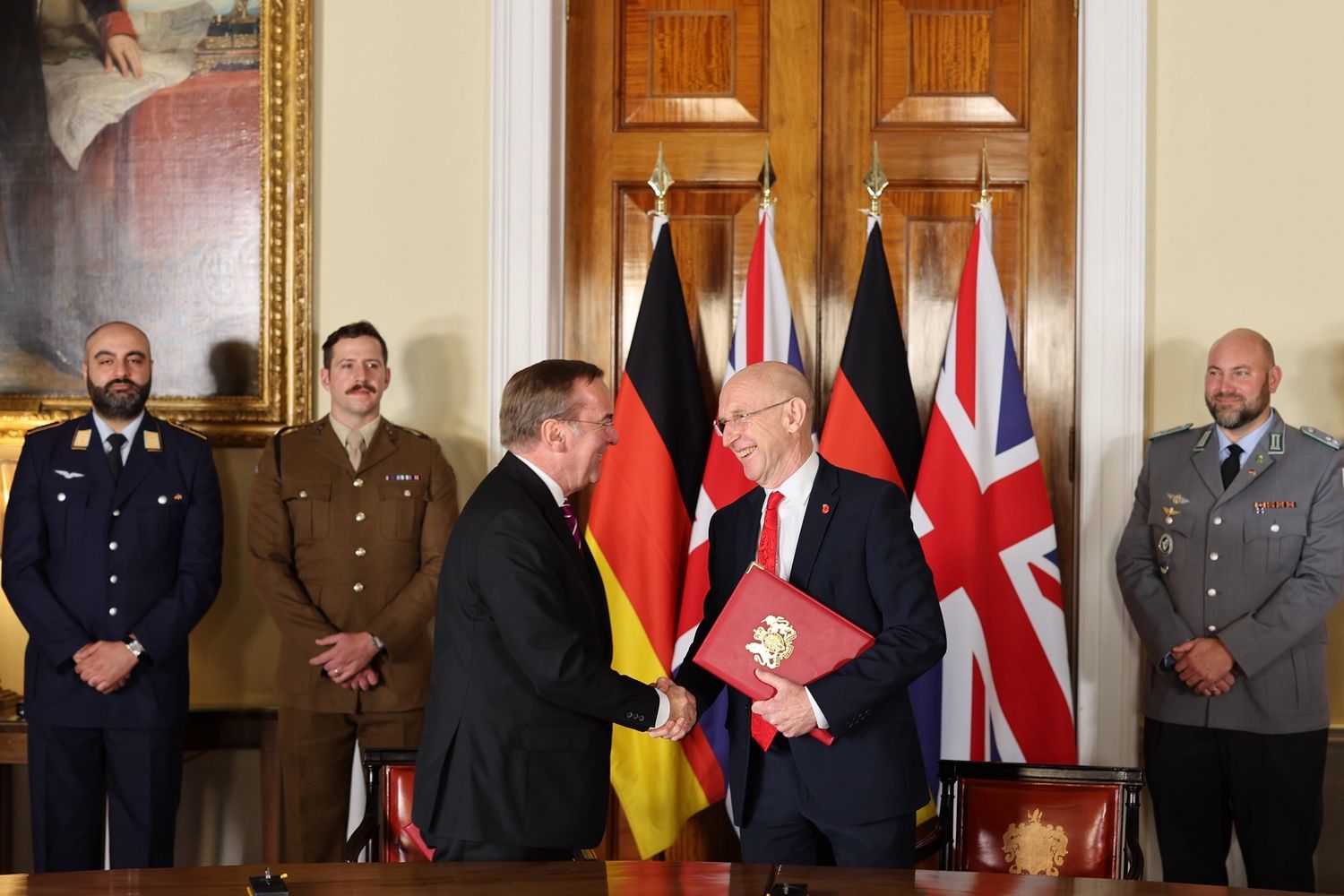UK-German defense agreement: drone development, long-range weapons, integrated air defense and support for Ukraine
The United Kingdom and Germany will significantly strengthen their defense cooperation with the signing of the Trinity House Agreement, subscribed on October 22 by British Defense Secretary John Healey MP and German Defense Minister Boris Pistorius. This agreement includes the joint development of loyal wingman unmanned combat aircraft, new long-range weapons, the integration of their air defense systems and extensive support for Ukraine, in addition to other key projects that consolidate collaboration between the two nations in the field of defense.
Together we are stronger ????
The UK and Germany are working as close as ever to ensure our common values, security and prosperity. pic.twitter.com/5VlVJfrYsH
— Ministry of Defence ?? (@DefenceHQ) October 23, 2024
“With the Trinity House Agreement, we are showing that the NATO Allies have recognised what these times require and are determined to improve their deterrence and defence capabilities. As it lays the foundation for future projects, the Trinity House Agreement is an important contribution to this. It is particularly important to me that we cooperate even more closely to strengthen NATO’s eastern flank and to close critical capability gaps, for instance in the field of long-range strike weapons”, German Defense Minister Boris Pistorius stated.
Defense Secretary, John Healey MP, declared, “The Trinity House Agreement is a milestone moment in our relationship with Germany and a major strengthening of Europe’s security.”.
Collaboration in unmanned combat systems
One of the central aspects of the agreement is cooperation in military drone development, an area in which both nations see significant potential. UK and Germany will work together on the development of unmanned combat aircrafts that can operate alongside manned combat fighters. Such drones, commonly known as “loyal wingman,” will be able to fly in coordination with manned fighters, multiplying their combat capability and reducing the risk to pilots.
These drones will play a key role in surveillance, reconnaissance and strike missions, and their integration with either current fourth-generation or developing sixth-generation fighter aircrafts (FCAS/GCAP) will allow both air forces to operate with greater flexibility in conflict situations.

The joint development of this capability is likely to build on the Wingman concept being worked on by the German subsidiary of Airbus Defence & Space, which was unveiled to the public for the first time in June at the ILA International Aerospace Exhibition in Berlin.
German aircraft operations in Scotland
The agreement will also allow German aircrafts, specifically P-8 Poseidon, to operate periodically from the Lossiemouth base in Scotland. These maritime patrol aircraft are essential for the protection of the Norwegian Sea and Greenland Sea, a vital region for European defense against Russian submarine incursion.

The presence of German aircraft on British soil not only enhances the protection of NATO’s maritime space, but also fosters joint training and knowledge sharing between the P-8 aircrews of both nations.
New long-range weapons
Under the agreement, the UK and Germany will also jointly develop long-range weapon systems. These new systems will seek to have greater accuracy and range than current cruise missile systems, such as the well-known Storm Shadow missile. Collaboration on these advanced developments will enable both countries to increase their ability to conduct accurate long-range strikes, strengthening their deterrence capabilities.

Although the UK MoD press release mentions the need to develop a replacement for its Storm Shadow cruise missiles, this objective is also in line with the bi-national FC/ASW (Future Cruise/Anti-Ship Weapon) program, a collaboration between France and the UK. This program seeks to develop two types of missiles to replace both the deep strike capabilities of the SCALP and Storm Shadow, as well as the anti-ship capabilities provided by the Exocet and Harpoon, currently in service on aircraft and ships of both countries. The agreement with Germany could be aimed at attracting its participation in this development, or to establish an alternative in case the collaboration with France does not prosper.
Air defense systems integration
Another key point of the Trinity House Agreement is the commitment of the UK and Germany to work on the integration of air defense systems, a necessary step to better protect European airspace from threats such as long-range missiles. The recent conflict in Ukraine has highlighted the importance of advanced air defense systems that are capable of detecting and neutralizing ballistic or cruise missile attacks.
This part of the agreement could serve as the pathway for the UK to join the European Sky Shield Initiative (ESSI), a German-led initiative to develop a European missile defense system. The ESSI program already has the backing of 21 European nations, which have signed a letter of intent, and the UK could join this joint effort to strengthen the continent’s air defense.
Support for Ukraine
Both countries agreed to collaborate in upgrading Germany’s Sea King helicopters with advanced missile systems.
“In the short term, we will collectively provide Ukraine with a new offensive capability by supporting the equipping of German-donated Sea King helicopters with modern missile systems,” says the British Ministry of Defence.

The statement does not specify what type of weaponry will be integrated into the Sea King helicopters donated to Ukraine. One possibility is the Brimstone, a 50 kg modular missile that is highly flexible and effective against land and naval targets. The Martlet, a light surface attack missile used by the Royal Navy’s Wildcat helicopters, or the Sea Venom/ANL, a helicopter-launched anti-ship system, co-funded by the UK and French governments, but still in the final stages of development, could also be considered.A promising future for European air defense
In summary, the Trinity House Agreement marks a crucial step forward in UK-German collaboration, with a significant impact on key strategic programs for European defense. These include the development of next-generation air combat systems, joint missile defense, unmanned combat systems and integrated naval airspace control.


Comentarios
Para comentar, debés estar registrado
Por favor, iniciá sesión